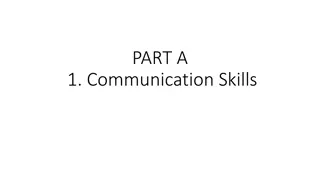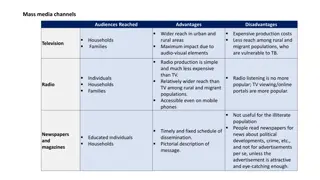
The Elements of Interpersonal Communication in Business
Explore the key elements of interpersonal communication, including the sender, receiver, feedback, context, message, channel, and noise. Learn how these components shape effective communication in personal and professional interactions.
Uploaded on | 0 Views
Download Presentation

Please find below an Image/Link to download the presentation.
The content on the website is provided AS IS for your information and personal use only. It may not be sold, licensed, or shared on other websites without obtaining consent from the author. If you encounter any issues during the download, it is possible that the publisher has removed the file from their server.
You are allowed to download the files provided on this website for personal or commercial use, subject to the condition that they are used lawfully. All files are the property of their respective owners.
The content on the website is provided AS IS for your information and personal use only. It may not be sold, licensed, or shared on other websites without obtaining consent from the author.
E N D
Presentation Transcript
Libyan International Medical University Faculty of Business Administration The Elements of Interpersonal Communication By: Salwa Mohamed Shembesh ID:4402 Email:salwa_4402@limu.edu.ly
Table of Contents Introduction Define interpersonal communication Elements of Interpersonal communication Importance of Interpersonal communication Conclusion References
Introduction Interpersonal communication is the process of sharing both ideas and emotions verbally and nonverbally with another person. It allows us to interact with and understand others in our personal and professional lives.
What is Interpersonal Communication? Interpersonal communication is the process by which people exchange information, feelings, and meaning through verbal and non-verbal messages: it is face-to-face communication .
Elements of Interpersonal Communication : These are the following elements of interpersonal communication include 1. Sender: is the person who is trying to communicate a message. 2. Receiver: The receiver is the recipient of the message and must translate the words into thoughts ,process the thoughts, and determine how to respond to the sender.
6. Feedback: Feedback is the process of determining if the message has been properly received. This can be initiated by the sender or receiver. For example : The sender may ask the receiver to repeat the message to confirm that the message was received as intended. 7. context: context is another way of taking into consideration the setting . Examples of context include : 1. What is going through the other person s mind when you show up? 2. What is the environment like? 3. What was the nature of the last contact and how did that go?
3. Message: while you may carefully choose the words to speak ,words alone represent a small percentage of what is received by the other person . In fact, according to the literature ,words carry the least value in the message. 4. Channel: Chanel is the medium used by the sender to send the message to the receiver. This may be in-person ,via telephone, e- mail, text message, written correspondence or a third-party 5. Noise: Noise refers to interference the takes place during the communication process. Both the sender and receiver may be distracted by noise . Noise may come from internal ( thoughts ,emotions ,ect.) or external sources (radios ,other conversations ).
Importance of Interpersonal Communication These are the following points that show the importance of interpersonal communication which are given below: 1) Improved Relationships With Family 2) Improved Relationships With Friends and Lovers 3) Improved Relationships With Colleagues 4) Improved Physical and Emotional Health
Conclusion Interpersonal communication is fundamental in building good relationships at the workplace which in turn contribute to increase in productivity.
Reflection In my opinion, Interpersonal communication helps us to connect with others and share ideas , it also helps builds relationships , teamwork ,and trust.
References Interpersonal Communication Essay - 2208 Words. Free Essays. (n.d.). Retrieved March 21, 2023, from https://ivypanda.com/essays/interpersonal- communication-2/ Author DunjaJovanovic Dunja Jovanovic is a content manager at Pumble. (n.d.). Interpersonal communication: Definition, importance, and skills to know. Pumble Blog. Retrieved March 21, 2023, from https://pumble.com/blog/interpersonal- communication/






















